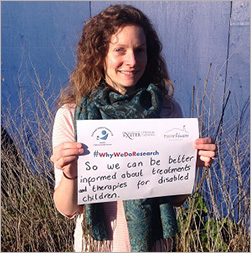
#WhyWeDoResearch
When people hear the term research it can conjure up a picture of a man in a white coat, test tubes and a laboratory. However there are other types of health research that address questions about the effectiveness of treatments and therapies, and the accessibility and efficiency of health services. Research is also often mistakenly perceived to be a closed world only for those ‘experts’ with a series of letters after their name who speak a separate language full of technical jargon.
Families affected by childhood disability are more than familiar with the exclusionary nature of such stereotypes. So as a childhood disability research unit committed to involving families as meaningful partners in our research, we are always up for things that will help break down barriers.
The PenCRU research team took part in a social media campaign (#WhyWeDoResearch) to help challenge this stereotype and show the people behind research. The initial aim of the campaign was to raise research awareness and opportunities to take part in research within a local NHS hospital (The James Paget University Hospitals NHS Foundation Trust, UK) but the response was global!
Shining a light on the motivation of those involved in research, nationally and internationally, people posted responses to the question ‘why do you do research?’ Read more about the campaign
As parent carers advise us on our research (usually in a comfy meeting room with a nice cuppa rather than a laboratory!), we took it as an opportunity to ask members of our Family Faculty what their motivation is. We put the responses we received together with the research teams’ responses in a short film.
The similar answers we received speak to the shared motivation we have to do research, the partnership we strive for by involving families in our research and the benefits of doing so. Like the social media campaign found, our film conveys the pride and enthusiasm members of the Family Faculty felt when sharing a common purpose and having their voice heard.
The exercise showed us that although putting your reasons for doing research into short sentences can be tricky, it is a great way to open up discussions. As such, we plan to use the #WhyWeDoResearch exercise in our introductory training for public patient involvement in research that we are developing together with members of our Family Faculty.
Sincere thanks to all the Family Faculty members and PenCRU staff who took part. We hope by sharing it here that it provides an insight into why other parent carers might want to join the PenCRU Family Faculty or get involved in research with other groups!

